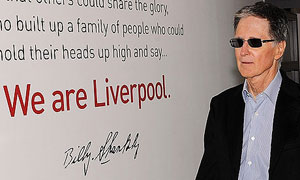

John W Henry, Liverpool's new owner, has not given any written guarantee that he will not offload his costs of taking over Liverpool on to the club.
Henry and his 16 partners in New England Sports Ventures made that commitment verbally before the takeover, to clear the £200m "acquisition debt" loaded on to the club by the previous owners, Tom Hicks and George Gillett, and not burden Liverpool with servicing their own purchase.
However in a detailed email Henry sent to the Guardian this week answering questions about the takeover, he said the Liverpool board, chaired by Martin Broughton, never asked for a contractual commitment from NESV not to load any of their acquisition costs on to the club in the future. "I don't remember anything being discussed along these lines," Henry said, "except that there was a desire for all of [Liverpool's] debt to be removed except stadium debt."
A spokesman for Broughton and the former managing director Christian Purslow, who voted to sell the club to NESV based largely on Henry's assurance that no "acquisition debt" would be loaded on the club, said they had not asked for written guarantees because such future commitments are not strictly legally enforceable.
Hicks and Gillett said in their own official offer document when buying the club in February 2007 that the payment of interest on their £200m borrowings "will not depend to any significant extent on the business of Liverpool". But subsequently they did make the club pay the multi-million pound interest costs.
Henry told the Guardian that he and his partners have, as they agreed before the takeover, paid off that £200m, and not substituted it with their own borrowings. "The simplest thing to say is that we removed all debt but the stadium debt," Henry wrote. "LFC is not servicing debt other than stadium debt."
Royal Bank of Scotland, to which £150m of the £200m was owed – the other £50m was owed to Wachovia – confirmed that it has now been repaid. That leaves Liverpool with a remaining debt to RBS of £37m, incurred on the plans to build a new stadium on Stanley Park, which NESV is now reviewing.
In his email Henry, who was in Liverpool today to meet Roy Hodgson, players and club staff and officials, declined to explain how NESV raised the £218m total cash required to buy Liverpool, and whether any of it was borrowed.
"I have certain obligations to my partners regarding confidentiality of a private company and in not disclosing our financials publicly," he said. "LFC discloses its financials annually, so monies going in and going out are disclosed. But I'm not going to disclose NESV financials or financing information."
However, detail in his email, and answers he gave to a Liverpool fans' website, www.redandwhitekop.com at the weekend, suggest that NESV did borrow some of the money to buy Liverpool. He suggested to Red and White Kop that the £218m was partly raised from the NESV partners personally and partly from borrowing.
"We have some very successful partners – some of whom are big [Premier League] fans – and we are well-financed internally," he told the website. "But NESV has always had debt, from the first day we purchased the Red Sox."
He added that seeking a financial return is part of NESV's business culture, and the partners can make a greater profit – the Internal Rate of Return – if they do not make the initial investment wholly with their own money, and instead borrow part of it. "We have some partners who look at Internal Rate of Return," he explained, "and almost demand that we have debt as a consequence. Debt increases IRR."
Henry, though, clarified this with the Guardian, saying only one NESV partner "is driven by" IRR, and "always sought higher IRR through borrowing". But he said that partner has been overruled: "The rest of us have preferred paying down debt."
Although he has given no written guarantee that NESV will not saddle Liverpool with the cost of their own takeover, Henry pointed to their ownership of the Red Sox and other sporting ventures since 2001, saying they have taken no dividend out and paid no financial return back to partners.
Describing Liverpool as a "big challenge," he said they were not seeking to take regular cash profits out of the club, but could make money "some day (hopefully a long time from now)" if they have done "the right things day-to-day" and the club becomes worth more as an asset to own